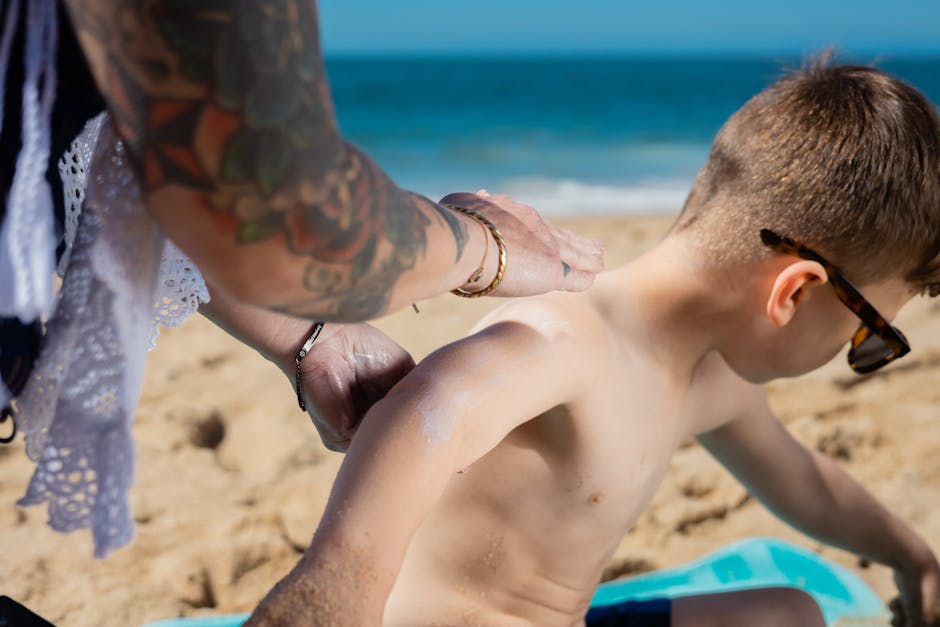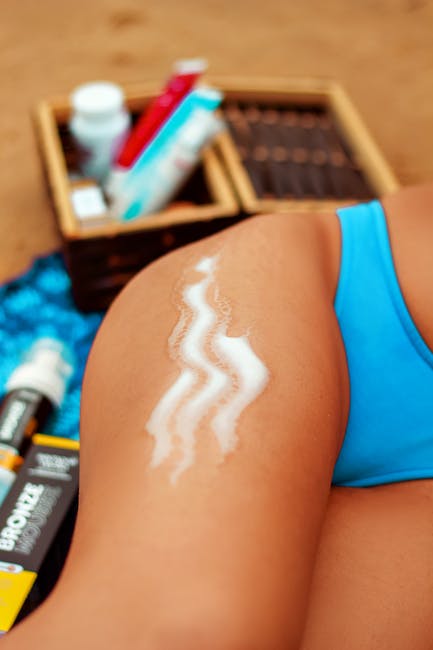Ever stepped outside on a sunny day and thought, “Do I really need sunscreen today?” Well, the answer is a resounding yes! Sunscreen is your skin’s best friend, a protective shield against the harmful effects of the sun’s ultraviolet (UV) rays. But why is it so important, and how does it work? Stick around, and we’ll dive into the fascinating world of sunscreen and skin protection.
Key Takeaways
- Sunscreen is crucial for protecting our skin from harmful UV radiation.
- Understanding Sun Protection Factor (SPF) can help you choose the right sunscreen.
- Incorporating sunscreen into your daily routine can offer numerous benefits.
- Selecting the right sunscreen depends on various factors, including your skin type and daily activities.
- Proper application and reapplication of sunscreen are key to effective sun protection.
- Sunscreen should be combined with other sun protection strategies for optimal results.
- Consistent use of sunscreen can offer long-term benefits, including prevention of premature aging.
Introduction to Sunscreen and Skin Protection
Importance of sunscreen in daily skincare
Sunscreen is not just for beach days or summer picnics. It’s an essential part of your daily skincare routine. It acts as a barrier, protecting your skin from the damaging effects of the sun’s UV rays. These rays can cause sunburn, premature aging, and even skin cancer. So, whether it’s sunny or cloudy, hot or cold, lather up with sunscreen to keep your skin safe and healthy.
Overview of UV radiation and its effects on skin
UV radiation is a type of energy produced by the sun. It’s invisible to the naked eye but can have significant effects on our skin. There are two types of UV rays that reach the earth’s surface: UVA and UVB. UVA rays can prematurely age your skin, causing wrinkles and age spots, while UVB rays can burn your skin. Both types can damage your skin’s DNA and increase your risk of skin cancer.

Understanding Sun Protection Factor (SPF)
Definition of SPF and its significance
SPF, or Sun Protection Factor, is a measure of how well a sunscreen can protect your skin from UVB rays. The higher the SPF, the more protection it offers. For example, an SPF 30 sunscreen allows only 1/30th of the sun’s UVB rays to reach your skin. This means it provides significantly more protection than an SPF 15 sunscreen, which allows 1/15th of the sun’s UVB rays to reach your skin.
How SPF relates to UVB protection
While SPF is a measure of UVB protection, it’s important to note that no sunscreen can block 100% of UV rays. An SPF 15 sunscreen blocks about 93% of UVB rays, SPF 30 blocks 97%, and SPF 50 blocks 98%. Beyond SPF 50, the increase in UVB protection is minimal.
Choosing the right SPF for your skin type
Choosing the right SPF depends on several factors, including your skin type, the intensity of the sun, and your activities for the day. For everyday use, a broad-spectrum sunscreen with an SPF of at least 30 is recommended. If you plan to be outdoors for an extended period, consider using a sunscreen with a higher SPF.

Daily Use of Sunscreen
Benefits of incorporating sunscreen into daily routine
Incorporating sunscreen into your daily routine has numerous benefits. It not only protects your skin from harmful UV rays but also contributes to your overall skin health. Let’s explore these benefits in more detail.
Maintenance of skin’s protective barrier
Your skin acts as a protective barrier against environmental factors like pollution and UV radiation. Regular use of sunscreen helps maintain this barrier, keeping your skin healthy and resilient.
Reduction in risk of skin damage and cancer
Sunscreen reduces your risk of skin damage, including sunburn, premature aging, and hyperpigmentation. It also lowers your risk of developing skin cancer, particularly melanoma, the deadliest form of skin cancer.
Importance of sunscreen during all seasons
You might think sunscreen is only necessary during the summer months, but UV rays can damage your skin year-round. Even on cloudy days, up to 80% of the sun’s UV rays can reach your skin. In the winter, snow can reflect UV rays, increasing your exposure. So, regardless of the season, make sunscreen a part of your daily routine.
Protection against UV rays in cloudy weather
Clouds don’t block UV rays; they merely diffuse them. This means you can still get sunburned on a cloudy day. Applying sunscreen can protect your skin from these sneaky UV rays.
Necessity of sunscreen use in winter
Snow reflects up to 80% of the sun’s UV rays, nearly doubling your exposure. This is particularly true at high altitudes, where the sun’s rays are stronger. So, whether you’re hitting the slopes or building a snowman, don’t forget your sunscreen.

Selecting the Right Sunscreen
Criteria for choosing daily sunscreen
When choosing a daily sunscreen, look for one that offers broad-spectrum protection, meaning it protects against both UVA and UVB rays. It should also be water-resistant, especially if you’ll be swimming or sweating. Lastly, choose a sunscreen with an SPF of at least 30, as recommended by the American Academy of Dermatology.
Broad-spectrum protection
Broad-spectrum sunscreens protect against both UVA and UVB rays. UVA rays can prematurely age your skin, while UVB rays can burn it. Both types can increase your risk of skin cancer.
Water resistance
Water-resistant sunscreens stay effective for longer in water or while sweating. However, no sunscreen is completely waterproof or sweatproof. So, be sure to reapply after swimming, sweating, or towel drying.
Addressing common misconceptions and misinformation
There are many misconceptions about sunscreen, such as the belief that people with dark skin don’t need it, or that sunscreen can completely block out the sun’s rays. These misconceptions can lead to inadequate sun protection. Remember, everyone, regardless of skin color, needs sunscreen, and no sunscreen can block 100% of UV rays.
Considerations for sensitive skin and mineral sunscreens
If you have sensitive skin, consider using a mineral sunscreen. These sunscreens use active ingredients like zinc oxide and titanium dioxide, which sit on top of the skin and deflect UV rays. They’re less likely to cause skin irritation compared to chemical sunscreens.
Zinc oxide and titanium dioxide as active ingredients
Zinc oxide and titanium dioxide are active ingredients in mineral sunscreens. They’re safe for all skin types and provide broad-spectrum protection. However, they can leave a white cast on the skin, which can be more noticeable on darker skin tones.

Proper Application of Sunscreen
Guidelines for effective sunscreen application
Applying sunscreen correctly is crucial for effective sun protection. Here are some guidelines to follow:
Amount of sunscreen to apply
Dermatologists recommend using a shot glass full (about an ounce) of sunscreen for your entire body. Don’t forget often-missed spots like the tops of your feet, your neck, your ears, and the back of your hands.
Frequency of reapplication
Sunscreen should be reapplied every two hours, or immediately after swimming or sweating. Even if your sunscreen is water-resistant, it can rub off or become less effective over time.
Special considerations for water activities and sweating
If you’re swimming or sweating, reapply sunscreen more frequently. Even water-resistant sunscreens can wash off or lose effectiveness when you’re in the water or sweating heavily.

Complementary Sun Protection Strategies
Combining sunscreen with other protective measures
While sunscreen is a crucial part of sun protection, it’s not the only measure you should take. Combine it with other strategies like seeking shade, wearing protective clothing, and avoiding peak sun hours for optimal protection.
Seeking shade and wearing protective clothing
Seek shade when the sun’s rays are the strongest, usually between 10 a.m. and 4 p.m. Wear protective clothing, like a wide-brimmed hat and sunglasses, to protect your eyes and face. You can also wear long-sleeved shirts and pants made from tightly woven fabric for added protection.
Avoiding peak sun hours
The sun’s rays are strongest between 10 a.m. and 4 p.m. If possible, try to avoid outdoor activities during these hours. If you can’t avoid being outside, make sure to apply and reapply sunscreen, seek shade, and wear protective clothing.
Role of makeup with SPF in sun protection
Some makeup products contain SPF, but they shouldn’t be your only form of sun protection. While they can provide some protection, they’re usually not applied thickly or evenly enough to offer adequate protection. So, apply sunscreen before putting on your makeup, even if your makeup contains SPF.
Limitations of SPF in makeup products
Makeup with SPF can provide some sun protection, but it’s usually not enough on its own. Most people don’t apply enough makeup to get the full SPF protection on the label. Moreover, makeup is often not applied to all the areas that need protection, like your neck and ears.
Sunscreen for Different Activities and Skin Types
Tailoring sunscreen choice to specific needs
Your sunscreen choice should be tailored to your specific needs. For example, if you’re going to be outdoors for an extended period, you might need a higher SPF. If you have sensitive skin, a mineral sunscreen might be a better choice. And if you’re going to be swimming or sweating, a water-resistant sunscreen is a must.
Sunscreens for outdoor activities
If you’re going to be outdoors for an extended period, use a broad-spectrum, water-resistant sunscreen with an SPF of 50 or higher. Don’t forget to reapply every two hours, or immediately after swimming or sweating.
Sunscreens for various skin conditions
If you have a skin condition like rosacea or eczema, you might need a specific type of sunscreen. Look for a mineral sunscreen with ingredients like zinc oxide and titanium dioxide, which are less likely to irritate sensitive skin.
The importance of consistent application for effective protection
Consistent application is key to effective sun protection. Apply sunscreen every day, even if it’s cloudy or cold. And remember to reapply every two hours, or immediately after swimming or sweating.

The Long-Term Benefits of Sunscreen Use
Prevention of premature aging
Regular use of sunscreen can help prevent premature aging caused by the sun. It can protect your skin from wrinkles, age spots, and sagging caused by sun damage. So, if you want to keep your skin looking youthful, don’t skimp on the sunscreen.
Contribution to overall skin health and appearance
Sunscreen not only protects your skin from sun damage, but it also contributes to your overall skin health and appearance. It can help maintain your skin’s natural complexion and prevent hyperpigmentation and uneven skin tone caused by sun exposure.
Navigating Sunscreen Options and Innovations
Understanding the latest sunscreen formulations
Sunscreen technology is constantly evolving, with new formulations offering improved protection and user experience. For example, some sunscreens now use nanoparticles to reduce the white cast left by mineral ingredients. Others include antioxidants to provide additional skin benefits. Stay informed about these innovations to make the best choice for your skin.
Keeping informed about new research and recommendations
New research and recommendations about sunscreen and sun protection are constantly emerging. Stay informed by following reputable health organizations like the American Academy of Dermatology and the Skin Cancer Foundation.
Conclusion
Recap of the importance of sunscreen
Sunscreen is more than just a beach bag essential. It’s a daily necessity for protecting your skin from harmful UV rays. Whether it’s sunny or cloudy, hot or cold, lather up with sunscreen to keep your skin safe and healthy.
Encouragement for making sunscreen a daily habit
Making sunscreen a daily habit can offer numerous benefits, from preventing sunburn and premature aging to reducing your risk of skin cancer. So, make sunscreen a part of your daily routine, and your skin will thank you.
Remember, your skin is your body’s largest organ, and it deserves the best care. So, protect it with sunscreen, and enjoy the sunshine safely.
Sun-Savvy Support: Your FAQ Guide to Embracing Sunscreen for Skin Protection
Why is it important to wear sunscreen?
Wearing sunscreen is crucial for protecting the skin from the harmful effects of ultraviolet (UV) rays. These rays can cause sunburn, lead to premature aging such as wrinkles and age spots, and significantly increase the risk of skin cancer. Sunscreen acts as a barrier that either absorbs or reflects UV rays, thereby safeguarding the skin from damage and maintaining overall skin health.
How does sunscreen work to protect our skin?
Sunscreen contains organic and inorganic chemicals that work by absorbing, reflecting, or scattering sunlight. Organic compounds in sunscreen can absorb UV radiation and release it as heat, while inorganic components like zinc oxide or titanium dioxide reflect or scatter UV light. This combination of actions helps to prevent UV rays from penetrating the skin and causing cellular damage.
What does SPF mean and how do I choose the right one?
SPF stands for Sun Protection Factor, and it indicates the level of protection a sunscreen offers against UVB rays, which are the primary cause of sunburn. The SPF number represents how long you can stay in the sun without getting burned while wearing sunscreen, compared to the time you can stay without protection. For example, SPF 30 means you can stay in the sun 30 times longer than without protection. Dermatologists generally recommend using a broad-spectrum sunscreen with an SPF of at least 30 for daily use.
How often should I reapply sunscreen?
Sunscreen should be reapplied every two hours, or more frequently if you are swimming, sweating, or towel-drying. Even water-resistant sunscreens can lose their effectiveness after 40 to 80 minutes in the water. It’s also important to apply a sufficient amount — about one ounce (or a shot glass full) to cover the entire body.
Can I skip sunscreen on a cloudy day?
It’s a common misconception that sunscreen is unnecessary on cloudy days. However, up to 80% of UV rays can pass through clouds, which means you’re still at risk for UV exposure. Therefore, it’s important to wear sunscreen every day, regardless of the weather, to protect your skin from potential damage.
Is sunscreen safe for all skin types?
Sunscreen is generally safe for most skin types, including sensitive skin. However, individuals with specific skin conditions or allergies should look for sunscreens that are fragrance-free, hypoallergenic, and formulated for sensitive skin. Mineral sunscreens containing zinc oxide or titanium dioxide are often recommended for those with sensitive skin because they are less likely to cause irritation.
Should children wear sunscreen?
Yes, children should wear sunscreen as their skin is more sensitive to the sun’s rays. It’s recommended to use a broad-spectrum sunscreen with an SPF of at least 30. For babies under six months, it’s best to keep them out of direct sunlight and dress them in protective clothing, as their skin is highly sensitive. Always consult a pediatrician before applying sunscreen to infants.
Can wearing sunscreen prevent tanning?
Sunscreen can reduce the ability of the skin to tan, but it does not completely prevent it. Tanning is a sign of skin damage, as it occurs when the skin produces more melanin to protect itself from UV radiation. Using a high SPF sunscreen can minimize tanning and protect the skin from harmful effects. Remember that there is no safe way to tan, and protecting your skin should be the priority.
Is there a difference between chemical and physical sunscreens?
Yes, chemical and physical sunscreens differ in their active ingredients and how they protect the skin from UV rays. Chemical sunscreens contain organic compounds that absorb UV radiation and convert it into heat, while physical sunscreens, also known as mineral sunscreens, contain inorganic compounds like zinc oxide or titanium dioxide that physically block or scatter UV rays. Some people prefer mineral sunscreens for their immediate effectiveness and lower risk of skin irritation.
How do I properly apply sunscreen?
For effective protection, apply sunscreen generously and evenly to all exposed skin 15 minutes before going outdoors. Don’t forget often-missed areas like the ears, neck, tops of feet, and the edges of clothing. Reapply every two hours, or immediately after swimming or excessive sweating. When using spray sunscreens, make sure to spray an adequate amount and rub it in for even coverage.



